- Home
- Patrick Ness
The Crane Wife Page 4
The Crane Wife Read online
Page 4
She was so upset, in fact, that he never told her or his father what he realised even in his eight-year-old brain, which was that if Roy’s bike hadn’t been there, if it hadn’t fallen in such a flukey way, first catching on the bumper to hold him in place, then coming dislodged at precisely the right moment to guide him clear, the old lady would have run right over him. The tires he could see turning through the frame of the bike – like dragons behind a cage, seconds away from eating him – would have driven over his head and neck.
But the unlikeliness of it all also meant that he wouldn’t have had that moment of staring up into the sky, a moment where he had been the only person who had ever lived in all of glorious creation.
George had no idea of the fate of the old lady. Perhaps even more strangely, he had no other memories of Roy either. He couldn’t even remember his last name or how well or badly he had recovered from his injuries. Nor could he place him back at O Come O Come, so perhaps he never even returned, his parents having who-knew-what reaction to the near death of their son. George did know that his own parents had given him $100 of the insurance settlement to spend – he bought books – and then used the rest to re-carpet the house. But as for everything else? Well, he lived, and what could have been a tragedy became instead a minor story, to be told now and then by his mother, exclusively in the context of how upsetting it had been for her.
Time passed. The fourth grade teacher at the public school turned out to be a wonderful woman called Mrs Underhill, and for reasons unknown – probably financial, his parents not being people who could really afford even a heavily church-sponsored private school; though possibly also because it was, frankly, a bit of a weird place and there were limits, after all, for sensible people – George left O Come O Come and returned to Henry Bozeman the following year. He performed well, well enough that both the town and his parents started to seem increasingly parochial, until he won a scholarship to a university on the whole other coast.
Once in New York, Miss Jones was finally proved prophet. Whatever small scholastic flair George had shown seemed to throttle back towards average. He managed to scrape a post-grad scholarship that took him to England just in time for him to stop really caring about a degree altogether. It didn’t matter. He met Clare at a party and rarely went home again, save for the funerals of first his father, from an on-site accident, then his mother, ostensibly from a heart attack but more likely from putting too much of her vital self into the keeping of her husband. Which happens. George settled in and had now lived in England longer than he had lived in the United States, which seemed like it should mean something important, but never actually quite did.
This story, though, had really happened, every detail, despite all its improbabilities. When he talked about it now, he realised as the years passed that he was telling it less and less as an emblem of his own history, as a single strand that told part of his life.
Because all those people, yes?
All those people who ran from the gas station and the grocery store, those were the people George began to think about more as he got older, especially as he became first a father to Amanda, then a grandfather to JP. All those people, strangers whose names he never knew, whose faces he would never remember, all those random individuals who had seen two very small boys get run over by an old lady in a massive car.
Did they ever tell this story, he wondered? Even though Roy and George had fully recovered, there were those unbearable few seconds where their fate was in flux, where all that was knowable was that two boys were probably on their way to death and there was nothing, not one single thing, that any adult watching could do about it, something that George only fully understood one afternoon when Amanda, fifteen steps ahead of him on a pavement and still struggling with this whole new walking lark, had suddenly lurched sideways and fallen off a curb between two parked cars, momentarily disappearing from sight. She’d actually stopped crying when she saw how upset her own father was and how fiercely he held her to his chest.
George felt connected, was connected to those nameless, anonymous witnesses who were now unfindable, even in this unstoppably networked age. Their lives had intersected with his for a moment, something that real life did in various ways at every instant of every day for every person everywhere, of course, but it only ever really mattered when it was you, didn’t it?
What was true, though, and what he thought about often, was that although he was the hero of his version of the story, naturally, he was also a supporting player in this same story when told by someone else. How did these people tell it, because it seemed likely they might? ‘You won’t believe what happened to me one day. I was at the supermarket, and I remember clear as anything, I’d bought a carton of cigarettes for Del and two bottles of grape juice. Don’t know why I remember it was two, but then I just happened to look up . . .’
And what of the old lady? What story did she tell, if at all, in her presumably few remaining years? And what about the ambulance drivers who can only have quickly forgotten an incident where two boys were mildly injured?
For that matter, what would Miss Jones’s version be like of the story where the crazy white woman bit her finger? Would it be any less true than his own? Than his mother’s? Which between them were different enough already.
Did it matter? George thought perhaps it did, and not in terms of finding the truth or of any hope of discovering what really happened at any given moment. There were as many truths – overlapping, stewed together – as there were tellers. The truth mattered less than the story’s life. A story forgotten died. A story remembered not only lived, but grew.
Whenever he finished telling someone his version of this story – his surprising American-ness explained, his late parents cast in their various thumbnails, the finger-biting that somehow led to a car accident – and the conversation then diverted itself down another track as someone else told their own story, he would often sit back a little, not listen very closely, temporarily retreating into his memory.
He would picture himself there, decades and an ocean and a continent away, under a beautiful blue sky, in the impossible silence of being pushed along a road on his back, under the watchful, terrified eyes of dozens of co-tellers, and because he could see it, and because they could, too, in all their different versions, as their lives crossed each other and bound together in what George could only describe as a mutual embrace, that moment still happened. It was always still happening.
And for that eternally repeated instant, pain was at bay, fear was held off, and everything was astonishment and wonder.
Things started to go wrong for Amanda this time when, of all the stupid places on this whole green earth, she and Rachel and Mei drove past the Animals In War Memorial.
‘What a fucking disgrace,’ Amanda said, alone in the back, despite being taller than Mei by almost half a foot and therefore a plainly more logical choice for the passenger seat. It reminded her, unavoidably, of trips as a child with her parents where she was expected to sleep her way to Cornwall across the back seat while George drove in his hummingly distracted fashion and her mother tried to catch up on legal briefs. It had already put a damper on Amanda’s mood for today’s picnic, but different arrangements were, it seemed, impossible. Mei always sat up front, and Rachel always drove, even though Mei and Amanda both had cars.
Those were the rules, among so many others. Amanda tried to follow them, but tended to fail on an ever-downward curve.
‘What, that?’ Rachel asked. Without lifting a manicured hand from the steering wheel, she pointed at the huge wall of curved marble plonked on a stretch of extraordinarily expensive real estate in the middle of Mayfair. It was approached, humbly, by statues of a horse, a dog and possibly a carrier pigeon, though Amanda had never ventured close enough to be sure. Why would she? Why would anyone?
‘Yes, that,’ Amanda said, even though a part of her brain was already screaming warning signals. ‘They Had No Choice,’ she read, intoning the motto
of the Memorial in what she felt was a pretty fair approximation of Huw Edwards. ‘Of course they had no choice! They were animals! It’s an insult to the actual men and woman, actual fathers and sons and mothers and daughters who died in war to equate them with a fucking Labrador.’
There was a silence, as Rachel and Mei exchanged a look in the front seat, and Amanda knew then that she was lost, that this might not be the last time she was invited to cram into Rachel’s car for a let’s-carpe-the unexpectedly-sunny-diem-and-have-an-impromptu-picnic/endurance-session in the park with her and Mei, but the list of invitations had definitely become finite.
Even saying ‘fucking’ (twice) had been a bit of a risk, but she’d thought she was the friend among the three of them who swore, the friend who knew how to roll a joint if required (it had not yet been required), and the friend who’d chewed through her marriage with a lack of decorum bordering on the hyena-like. Rachel and Mei were both divorced, too, though not quite so young and not quite so vigorously. It was the role they’d given her, one she’d done her best to fill.
Oh, well, sighed the voice in Amanda’s head. Fuck ’em.
Even after eight months, Amanda was still the new girl. She was a transport consultant, as were Rachel and Mei. They were three of nine women in a company of seventy-four, which had to be illegal. It wasn’t that transport was such a non-woman sort of industry necessarily (though it was a little), it’s that this particular company – Umbrello Flattery and Unwin – had a Head of Personnel (Felicity Hartford, unquestionably woman number one out of nine) who hated other women. She’d informed Amanda at her interview that Amanda was ‘at best’ the eighth most qualified applicant (of eight), but that even the elderly Umbrello Senior had begun to wonder why his newly-retired secretary had been replaced by a fashionable young man with what looked like a ‘shaft of metal, Mrs Hartford’ pierced through the skin under the back of his shirt collar. Before Mrs Hartford was ‘bored into her grave by yet another lawsuit’, Amanda would have to do.
Amanda worked in Rachel and Mei’s unit – Mrs Hartford liking to keep the women in as few groups as possible, which made it easier to fire the worst one should she wake up in the morning with the inclination to do so – and they’d taken her under their wing as a fellow young divorcee. They invited Amanda out to lunch her first day, and in those forty-five minutes Amanda had learned not only that Rachel had put the naked pictures she’d found of her ex-husband’s mistress on the memorial website of said mistress’s late mother and that Mei struggled with thrush, but also that Rachel had survived – and possibly started – a house fire in college that had killed two of her roommates and that Mei had three separate, eye-watering anecdotes about circumcised men. ‘Were they brothers?’ Amanda had laughed, a deep, gravelly, dirty laugh she might have said was her best feature, had anyone ever asked.
No one had laughed back. It had been a long eight months.
‘Can you get the picnic basket?’ Rachel asked, as she pulled her Mini into a space.
‘Sure,’ Amanda said. She always got the picnic basket.
Mei got out of the passenger side, face concentrating hard on her phone. She was tracking her infant daughter on GPS during a visitation weekend with the baby’s father. ‘That’s unbelievable,’ said Mei, who didn’t believe anything. ‘He’s taken her to Nando’s.’
‘What the fuck is in here?’ Amanda asked, gracelessly dragging the unreasonably heavy basket out of the Mini. She felt like a rhinoceros backing out of a display cabinet.
‘You know, you’re twenty-five?’ Rachel said. ‘Which is younger than us, okay, I get that, but still too old to talk like you’re on Skins?’
‘Sorry,’ Amanda grunted, as she finally got the picnic basket out of the car. Where it promptly plummeted to the ground. A puddle of wine bubbled out the basket’s bottom like a particularly expensive spring.
Rachel sighed. ‘That was like our only bottle of red?’
‘Sorry,’ Amanda said again.
Rachel said nothing, just let an awkward moment of silence pass while she waited for Mei to notice Amanda standing in the puddle of Pinot.
‘Ooooooh,’ Mei whispered, finally seeing. ‘I don’t believe it.’
Amanda always started well with friends. In primary and secondary school, in college, at the different jobs she’d had since graduating, plus of course the gang of friends that had hung around Henri. They all liked her when they first met her. Really, they did.
Things that might have been threatening in a man – her slight tallness, her slightly broad shoulders, her deep, commanding voice – were conversely disarming in a woman. Men would look at her and think ‘woman’ but also somehow ‘rugby’ and find themselves buying her a pint while asking her whether she thought that hot Dutch girl reading Economics would give them the time of day. Gay men rather liked her, which had its benefits but was also a bit like being spayed, while women seemed to cherish her at first as someone around whom they could finally be themselves, speak their minds, not feel so bound up in girly competitiveness. She was a proper mate, she was.
In this, apparently, they were mistaken.
‘Oh, look!’ said (to select one among many) her newest best friend in college, Karen, who also read Geography and also didn’t see the point of Bristol and also thought that the failure of each and every political philosophy throughout history could be boiled down to the simple, basic truth that People Are Dumb. ‘The Wizard of Oz is on!’
‘Really?’ Amanda said, flopping down on the couch beside her. They’d had a hot night out. Her best clubbing clothes were stuck to her from the evening’s sweat, her feet were killing her in these shoes – women this calcium-dense were not natural matches for high heels – and though she and Karen had danced and drunk and laughed and smoked all night, neither of them had managed to pull or even catch a boy’s eye. To be fair, Karen had a nose issue. And an eyebrow issue. And, well, a limp, but you could hardly see it while they were dancing. Still, they’d had fun. It was all very promising.
With some help from her mother and stepdad Hank – her father was paying the tuition fees and she knew he could barely afford those, so she always lied when he asked if she ever needed anything more – Amanda had just about enough to rent half a two-bedroom near the university for her final year. Karen had responded to Amanda’s notice on the college room exchange site. They’d had coffee, they’d hit it off, they’d moved in. Two weeks and no problems so far.
‘I didn’t even think they bothered showing this on TV any more,’ Karen said enthusiastically, tucking her uneven feet beneath her on the couch. She inhaled deeply, readying herself to join in on the next chorus of ‘We’re Off To See–’
‘I hate this fucking movie,’ Amanda said.
Karen choked on what could only have been the air she just breathed in. ‘You what?’ she coughed, looking like Amanda had just punched her. Actually punched her.
Amanda ploughed on, oblivious. ‘None of it’s real, even in terms of the story. In order for the plot to work at all, everyone has to act like a complete moron, and then they get to the end and not only is there no magic, the wizard is just some show-off loser who’s tricked everyone into following him, and before they can try his ass before the International Courts of Justice, he escapes in a balloon. He’s practically Miloševi[ć].’
She stopped briefly, because she could see the whites around every part of Karen’s eyes, but she hoped it was from the dodgy tablets they’d bought from the overweight boy by the toilets, who’d said they were Ecstasy he’d found in his older brother’s old bedroom, so they could have been up to twenty years expired and were probably, in the end, Panadol.
‘You’re joking, right?’ Karen said.
‘And then she goes back home,’ Amanda sailed right on, thinking, somehow, that this was encouragement, ‘and we’re supposed to be happy that she’s returned to her old, small, black-and-white horizons? That dreams are all well and good, but don’t forget that you’re actually trapped on the f
arm forever? Same reason I hate the Chronicles of fucking Narnia. Oh, God, and don’t get me started on him.’ The Cowardly Lion minced onscreen. ‘The stuff of nightmares.’
Karen looked incredulous. Or rather, more incredulous. ‘The Cowardly Lion?’
‘Oh, come on. Look at him and tell me you don’t see every paedophile you’d warn your daughter away from. I always think he’s about to whip it out and lay down on top of Dorothy.’ She put on a frankly hideous version of the Cowardly Lion’s voice. ‘Come on, little Dorothy, sit on your Uncle Lion’s lap and he’ll show you why he’s king of the jungle, uh-huh, uh-huh. And then he pushes her to the ground and pulls her panties right on down to those ruby–’
Amanda stopped because the look on Karen’s face was, at last, unmistakeable. Panadol never made anyone look that way.
‘Well, don’t cry about it,’ Amanda said, but it was too late.
Karen, it turned out, had been ‘fiddled with’ – Karen’s own horrible, multiply-repeated phrase – by her grandfather from ages five to fourteen. It only stopped when he’d died. Not only that, when she’d told her parents, they’d thrown her briefly out of the house, allowing her back to do A-levels only when she’d completely recanted.
‘You don’t know,’ she’d sobbed into Amanda’s arms in the long, long hours that followed. ‘You just don’t know.’
‘I’m sorry,’ Amanda said, awkwardly patting Karen’s head. ‘No, I don’t.’

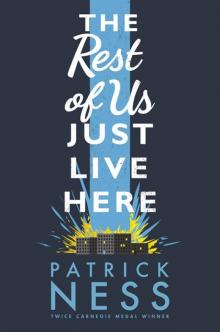 The Rest of Us Just Live Here
The Rest of Us Just Live Here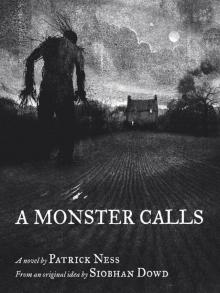 A Monster Calls
A Monster Calls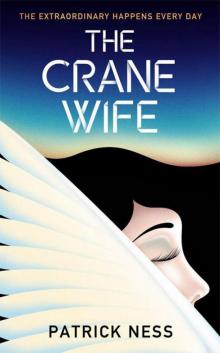 The Crane Wife
The Crane Wife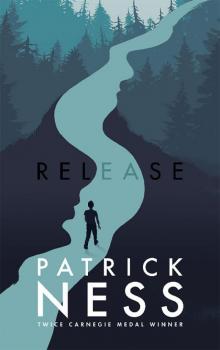 Release
Release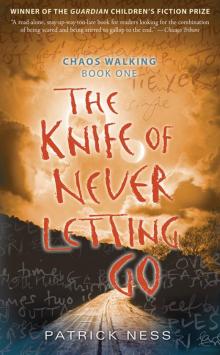 The Knife of Never Letting Go
The Knife of Never Letting Go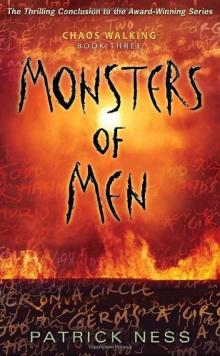 Monsters of Men
Monsters of Men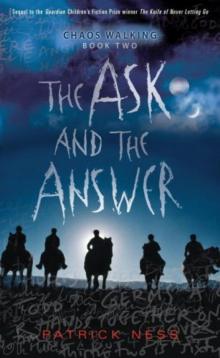 The Ask and the Answer
The Ask and the Answer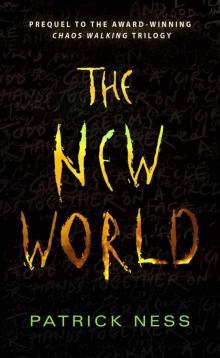 The New World
The New World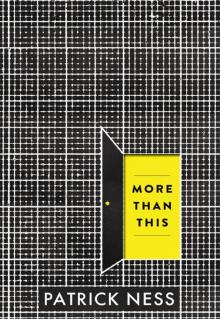 More Than This
More Than This Burn
Burn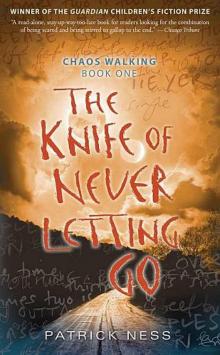 The Knife of Never Letting Go cw-1
The Knife of Never Letting Go cw-1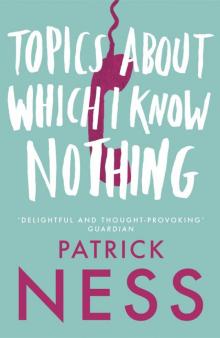 Topics About Which I Know Nothing
Topics About Which I Know Nothing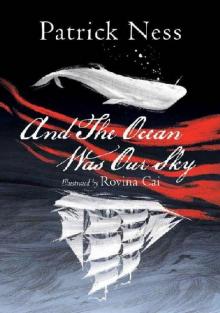 And The Ocean Was Our Sky
And The Ocean Was Our Sky The Stone House
The Stone House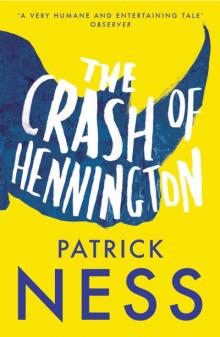 The Crash of Hennington
The Crash of Hennington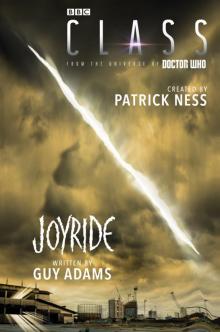 Joyride
Joyride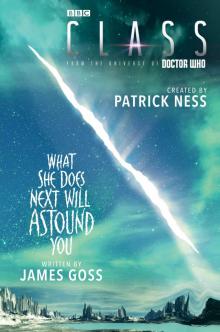 What She Does Next Will Astound You
What She Does Next Will Astound You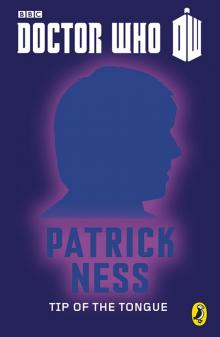 Tip Of The Tongue
Tip Of The Tongue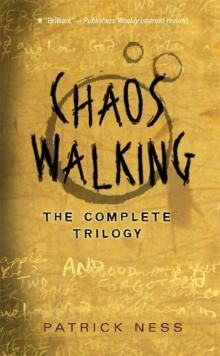 Chaos Walking
Chaos Walking